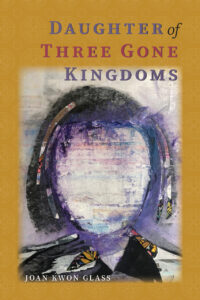 Review by Ruth Hoberman
Review by Ruth Hoberman
Joan Kwon Glass’s first full-length collection of poems, Night Swim, was steeped in the grief of having lost to suicide first her young nephew, then her sister. This second collection, Daughter of Three Gone Kingdoms, explores loss in broader terms—placing it in the context of geographical dislocation, political violence, and America’s own strange cruelties and dangers. With their (mainly) long lines and unadorned diction, these poems are accessible and compelling. Many start in familiar settings—Pizza Hut, the Barbie movie, the mall, a Big Boy restaurant—then zoom out into deeper considerations before returning us to an everyday world we now see is more complicated and poignant than we had imagined.
Korea haunts the book, particularly its first half. Glass’s mother was born there, and Glass herself spent childhood summers visiting her grandmother there. The book’s title evokes the “Three Kingdoms Period” of Korean history, a period of independence predating various incursions and occupations—by China, Japan, then (after World War II), by the US and the USSR. “During the occupation they burned our history,” Glass writes of the Japanese in “Black Cows.” And in “Inheritance”: “decades of other countries deciding/who koreans should (not) be….one wrong history giving way to another/until you find yourself stranded/at home.”
“Wrong history” imprints itself on the psyches and bodies of those enmeshed in it. Glass’s grandmother learns to “endure/shame if it meant that when it passed,/she was still standing.” In America, her mother accepts the exile of her Korean food to a refrigerator in the garage (the kitchen filled by the white, American-born father’s “cheddar cheese and Oreos”).
Structured chronologically, Glass’s book moves from Korea through the speaker’s childhood, into her role as a teacher and mother—chronicling, in the process, a series of “gone kingdoms”: not just Korea, but also a mother diminished by marriage who grows smaller and older; a father who leaves; a grandmother and sister who die. Gone but not gone. The couch holds her father’s shape well after his departure, Glass writes in “What Mattered.” And under everything, “the familiar hum of my hunger.”
The speaker’s appetite is inseparable from her rage, as expressed by twelve “hungry ghost” poems scattered through the book. In Korean tradition, thirty-six spirits or “hungry ghosts” have been condemned, due to misbehavior (generally greed and selfishness), to unrest after death. Glass’s hungry ghost poems are short, lyrical, and fierce. “There is a hunger that wants to be fed,/and there is a hunger that burns,” she writes in “Blazing Hungry Ghost,” and in “Living on Hope Hungry Ghost”: “Since learning to eat grief,/I have been insatiable.”
But Daughter of Three Gone Kingdoms is about our world as much as it is about Glass’s grief. “Armistice,” the book’s final poem, has a children’s song as its epigraph: “Mountain bunny, bunny/Where are you going? Where are you going?” The poem opens in a classroom where the speaker notes that on a pre-war map, Korea looks like a hare on its hind legs. She asks her students where, given the choice, they would most like to live. “An island,” one says, recently arrived from Turkey. “I think there would be less/war on an island.” The twelve-year-old students, “already/learning to armistice themselves,” are all too aware of the violence around them—not just in wars abroad, but also in shootings, prejudice, and random cruelties.
In the children’s song, Glass points out, we never learn if the hare makes it to the top of the mountain:
… Even so, we sing it,
raise our hands, fingers hooked in the shape of ears.
We hop, smile, tell our children to climb,
show them how to lift chestnuts from the ravaged ground.
None of us can remember learning this song,
but all of us know it by heart.
That the ground is ravaged is a given. Yet we want children to feel safe, have fun. Even as we fear for their safety, we pantomime delight.
A similar sense of precarity underlies “Taking My Daughter Out for Smoothies,” perhaps my favorite poem in the book. As the speaker drives home, worried about her teenage daughter’s well-being in a world that “quivers/with heat, exhausted, as though our mere existence /tests its limits,” the daughter asks about God: “Like, when I pray, how do I even know if he’s listening?” How much can a mother ask without intruding? How can she even pretend to have an answer? And most literally, is it safe to take her foot off the brake and cross the intersection? “I nod my head,” the poem concludes, “look left and right, wait/for a sign that it’s safe to keep going.”
Daughter of Three Gone Kingdoms by Joan Kwon Glass
Perugia Press. 2024 $18.00 [Paper]
ISBN: 978-0-99-780768-4
Ruth Hoberman is a professor emerita of English at Eastern Illinois University. Since her 2015 retirement, her poems and essays have appeared in such journals as Smartish Pace, RHINO, Comstock Review, Michigan Quarterly Review, and Ploughshares.
